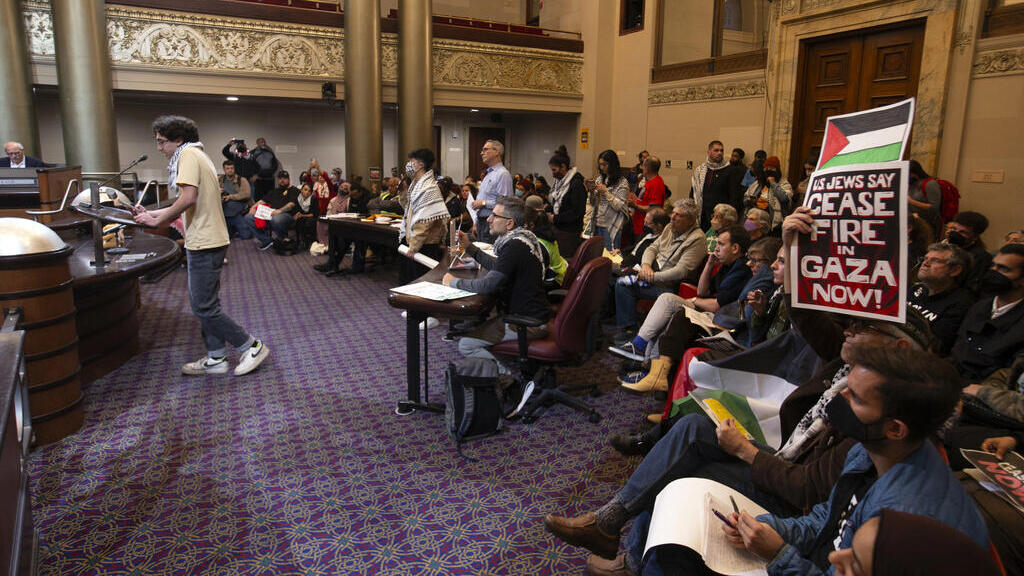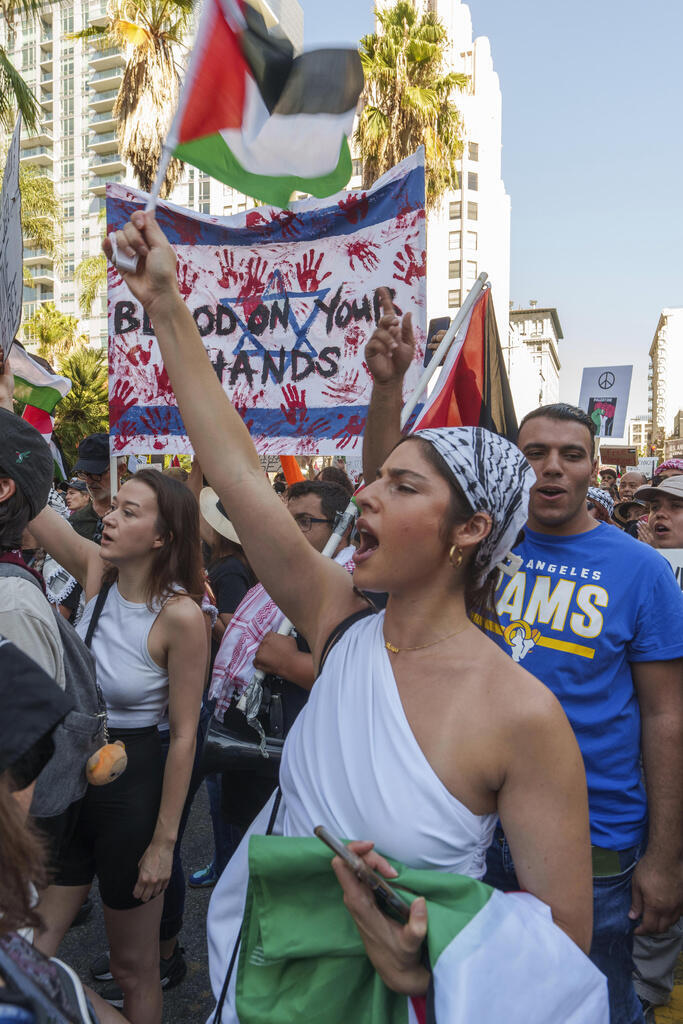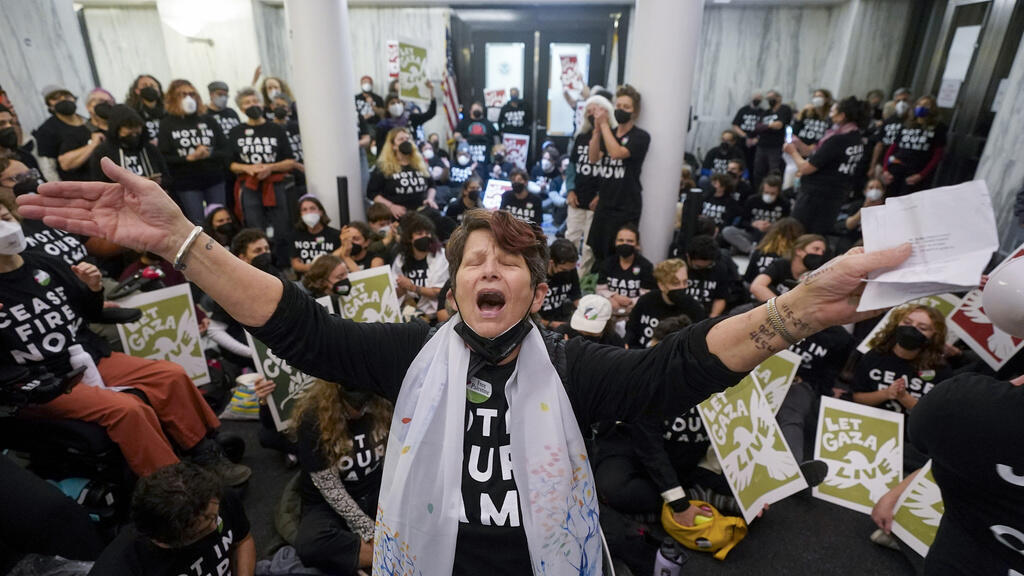Getting your Trinity Audio player ready...
Welcome to Richmond, California - a city with a population of 16,000, famed as “America’s Shipbuilder” during the Second World War and presently as the hometown of Master P, a rapper you’ve probably never heard of. Since October 25th, the city has acquired a further claim to fame: The first city in the United States to condemn Israel, accusing her of the “ethnic cleansing and collective punishment” that led to the October 7th attack.
Read more:
In a marathon debate that carried on into the night, the city council announced 1 am in support of the Palestinian people in light of the Hamas attack, calling for an "immediate humanitarian ceasefire and the safe passage of substantial humanitarian aid to Gaza." The city council declared that “the state of Israel is engaging in collective punishment” that “is considered a war crime under international law.”
The city also called to “end Israeli Apartheid, the occupation and obstruction of Palestinian lands by Israeli army forces.” The resolution, signed as crowds in attendance shouted “Free, Free Palestine”, declared that the city opposes the “enormous military aid provided by the United States every year, hereby also depriving Americans of money for their own urgent needs.”
To nonetheless express its support for the city’s small Jewish community, the resolution recognized the “historical memory of the Holocaust”, further noting that “Never Again… means fighting ethnic cleansing and apartheid everywhere.”
Jewish residents at the council meeting shouted at city mayor, Eduardo Martinez, “Nazi” and “the most antisemitic mayor here ever”, leading to yet more shouting and a delay in the vote.
He denied that the resolution was antisemitic, saying "I reject the notion that speaking out against Israel's military and right-wing government is antisemitic. We should never stay silent when it comes to any group. The Palestinian people are currently dealing with what the United Nations calls war crimes by the state of Israel… there has not been a single word that says we are against the Jewish people… If it sounds one-sided, it’s because it voices a narrative that has been ignored.” Martinez continued: “If my words pain you, I’m sorry, but they are words that have to be said.”
At the end of the debate one attendee, Shaun Kozolchyk, commented that “Hamas had a great night in Richmond” and that “We witnessed what can only be described as a verbal intifada.” She published a column in the local Jewish newspaper, writing that “our local city council in Richmond passed a blatantly antisemitic resolution filled with inflammatory lies and propaganda to hold Israel accountable for everything that happened to the Jewish state on Oct. 7. Although the original resolution was amended during the meeting to at least mention Hamas and the deaths of Israeli civilians, the intent and result remain the same.”
Kozolchyk has lived in the city for almost a decade. She says that her family “fell in love with our diverse and vibrant community” 85% of which is not white – 45% Hispanic and 20% Black. “My husband (until this vote) served on the Richmond Design and Review Board, and our family volunteered many hours in support of our beloved city. That is the reason I went to the meeting. I wanted to make my family’s voice heard.”
“With seething hate coming from the other side. There were several moments when it seemed there would be a physical manifestation of that hate, but the police in the room were just enough of a deterrent when things started to escalate.”
“We sat with our Israeli flags and hostage posters, while they called for our mass extinction. This is not hyperbole…. But you cannot imagine what it felt like to be inside, to look into the eyes of our local elected officials, and to know immediately that they didn’t want us there. We were not welcome, though the council put on a fine show of pretending we were. The council members certainly didn’t want to hear reason or facts… The council members did not listen to a word we said. I could see the disgust in their eyes — when they would look at us at all. I felt like we were invisible to them — or worse, dispensable and of no value to our community… We walked out of that living nightmare into the darkness and drove home, knowing that we have neighbors who would be gleeful if our entire families were murdered.”
She continues “My daughters, along with so many other Jewish students right now, are asking if they should remove their Magen David necklaces. It’s Santa Barbara! It’s Richmond! It’s not Berlin in 1938. It’s the United States of America in 2023!”
“I can deal with a raging white man with swastika tattoos and guns holstered. I grew up in Arizona and worked for the Anti-Defamation League for eight years. I’m used to that brand of Jew hater screaming in my face. I’ve come to realize I will take that variation of antisemite any day of the week over what I went through here.”
“That’s because the poison-spewing Richmond crowd actually represents my side of the political aisle — albeit the far reaches of that left side — and yet they sure sounded like Nazis to me. The far-left is gaslighting us, using the Holocaust as a bludgeon against the Jewish state and trying to convince anyone who will listen that the Jews are the Nazis now.”
“The Jews of Richmond may decide to divest from this rotten city, but we will not let the goals of Hamas, Iran, Russia or any other Jew-hating monster be achieved. Our mezuzah will always remain on our doorpost, and my daughters will not take off their necklaces — no matter how many ways people tell us that they hate us.”
Not far from Richmond, Oakland - a city numbering 434,000 - followed in her neighbor’s footsteps. The city council voted unanimously for a statement calling for an immediate Israel-Hamas ceasefire. This also followed long hours of tumultuous debate in which various organizations talked about the tragedy in Gaza and the thousands of civilian deaths. The announcement is only an official statement and has no validity beyond public condemnation. It calls for Israel to respect international law and allow unlimited humanitarian aid into Gaza and calls for the restoration of basic services and the release of all the hostages. The initial proposal to condemn the massacre hostage taking was rejected.
In the same week, further large cities including Detroit, Seattle, and Atlanta adopted similar statements. It’s doubtful that the cities’ officials were elected on their platforms on the Middle East rather than street cleaning, but these city councils have somehow become the new forum where Americans conduct aggressive arguments about the war in Gaza and White House support for Israel. Although this list of cities is getting ever longer, Richmond and Oakland have placed themselves at America’s anti-Israel forefront.
Then came the “restroom incident”. An Israeli woman was shocked to discover anti-Israel graffiti daubed across Oakland, including in the restrooms of a café in the city. After complaining to staff, she asked to return to the stalls to show them the graffiti. Understanding where this was going, they blocked her entrance, saying "I know Israel loves taking private property and saying it's their own." Café management later condemned the incident. But it was too little, too late.
Before this, dozens of demonstrators protesting the White House’s military aid package to Israel blocked the entrance to the city’s port and took control of a moored military ship they claimed was about to sail to the Middle East. "We're hoping that ... the workers … will not load that military cargo... we are simply trying to call for an immediate cease-fire and stop the aiding of genocide."
Last week, the city’s public schools also became a battlefield as dozens of teachers gave their pupils unauthorized pro-Palestinian lessons, as part of a pirate “teach-in” held by a group of the city’s teachers’ union activists. The event’s anonymous organizers compiled a long list of “study materials” for 8th through 12th grade students. The document describes Israel as an “Apartheid State” and refers to the “oppression and ongoing historical genocide of the Palestinians.” The city’s education department came out against the initiative, calling it “divisive” and “harmful” but, to the dismay of Jewish parents and organizations who feared the teach-in would only fuel antisemitism, no steps were taken against the teachers who took part.
Although all of these events somehow made their way to Oakland and Richmond, one might argue that these cities have only randomly earned their front-runner-status and that the whole of the San Fransisco Bay area is in a similar situation. It’s a combination of an area flying the progressive flag and a large, 250,000-strong, Muslim population – albeit not Palestinians or Muslims from the Middle East but rather Muslims from India and South East Asia drawn into the area by the high-tech industry.
Older Jewish residents we spoke to explain that it’s not wild antisemitism, but rather “crazy progressivism” that has swept the area. “The people who come to live here are mainly young people looking to improve their housing situation and quality of life outside of San Fransisco. It’s a young generation, raised to think that Jews are white and that they’re colonialists, so it’s the struggle of Blacks against Whites” says one Jewish resident. “It doesn’t come from antisemitism. The source of the hatred isn’t Jews or Israel. Much of it is about how the Whites conquered America from the poor Indians. All surveys show this area as the state’s leader in progressivism.”
He says “Their aim is always to fix what’s broken and, for years, they’ve been saying that what’s broken is the Occupation, so this is what needs fixing. They all condemn October 7th. This doesn’t stop them from demanding a ceasefire. They use terms they’ve gotten into their heads like ‘genocide’. Trying to change their mind is like talking to the wall. It’s like trying to change the mind of a flat-earther. They say ‘You’re colonialists and you took the land.’ You can give them explanations from today to tomorrow, but it won’t change anything. They’re not fighting for peace. That’s not where they’re going with this. They don’t believe in two states for two people, but rather that we took the land and that we now have to leave it. “
They claim that the conflict is exacerbated by the fact that the local Jewish community has been so successful in its goal of assimilation that it’s become a problem: “What we’ve built here over the past 200 years - money, influence, centers of power - has removed Jews from the minority category. Jews very much wanted to stop being a persecuted minority, and have done so well that they’re now classified as rich and influential Whites. We’re not regarded as a minority, but rather as an elite. Then, anyone who feels like a minority is opposed to us. These can be gay, black, Hispanic, or even white people who sincerely believe they need to fix things. The Palestinians, on the other hand, will place themselves in the family of minorities. They’re now in the same category as Blacks – regardless of the conflict. It’s not even part of the equation. “
Although they say that the anti-Israel sentiment in these cities “isn’t personal”, but rather part of a broad context of elite vs. oppressed, the Jewish community is sensitive to antisemitism and the other side is exploiting the situation. “It’s not about power. In numbers, we’re still a minority and we only respond. We only react but don’t initiate. The other side shows up at these events very prepared and in large numbers. They bring along small children and manage to convince everyone that they’re the underdog. The city has no real opinion on the matter. They pass whatever the residents bring up and move on. The Jewish organizations try to pressure the council not to take sides in the conflict, and not to condemn Israel. However, when it comes to a ceasefire it gets more complicated. How can anyone say they’re against stopping fighting and people getting killed? We have to be more proactive.“
The Jewish and Israeli communities are themselves divided as to how to address the problem. “Some say it doesn’t matter, that’s it’s all BS. What does it matter if they pass a resolution or have a demonstration against us in a mall in Oakland? It changes nothing in Gaza. But others feel that we need to fight to prove we’re right. American Jews are used to this. This isn’t the first time they’ve struggled with these kinds of situations. The Israelis don’t understand what it’s like being a minority, so they find themselves in a weird situation. They show up at these arguments and want to fight these battles with force. American Jews don’t operate like this. They’re up against these city councils year after year, advocating diplomatically, choosing to keep themselves to themselves and not enter the conflict. Their goal is that the city won’t take sides. That’s the motto as much as possible. The final goal is to reduce the flames of antisemitism and not prolong the fighting in Gaza. We all understand that this is what the debate here is all about.”





